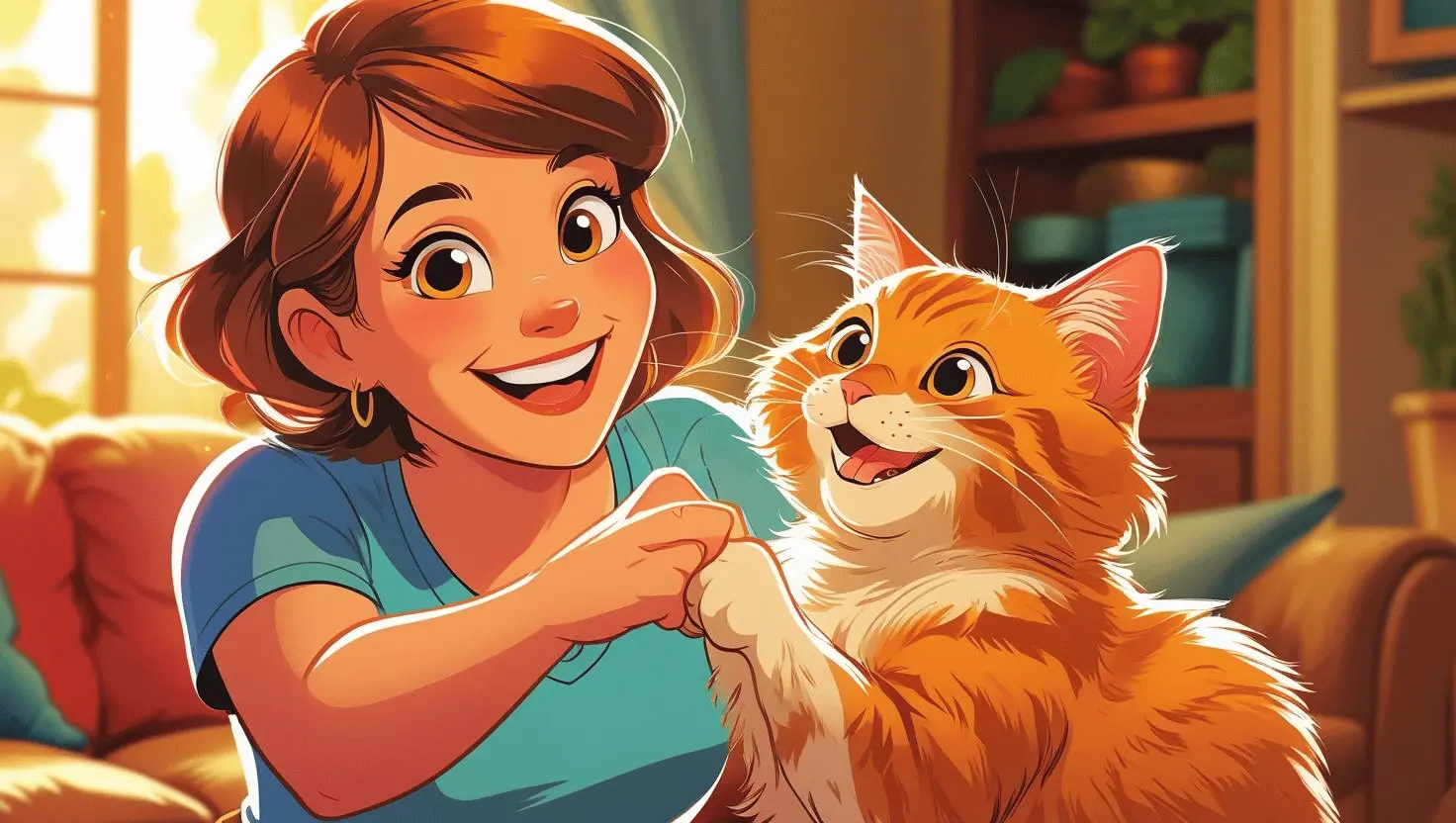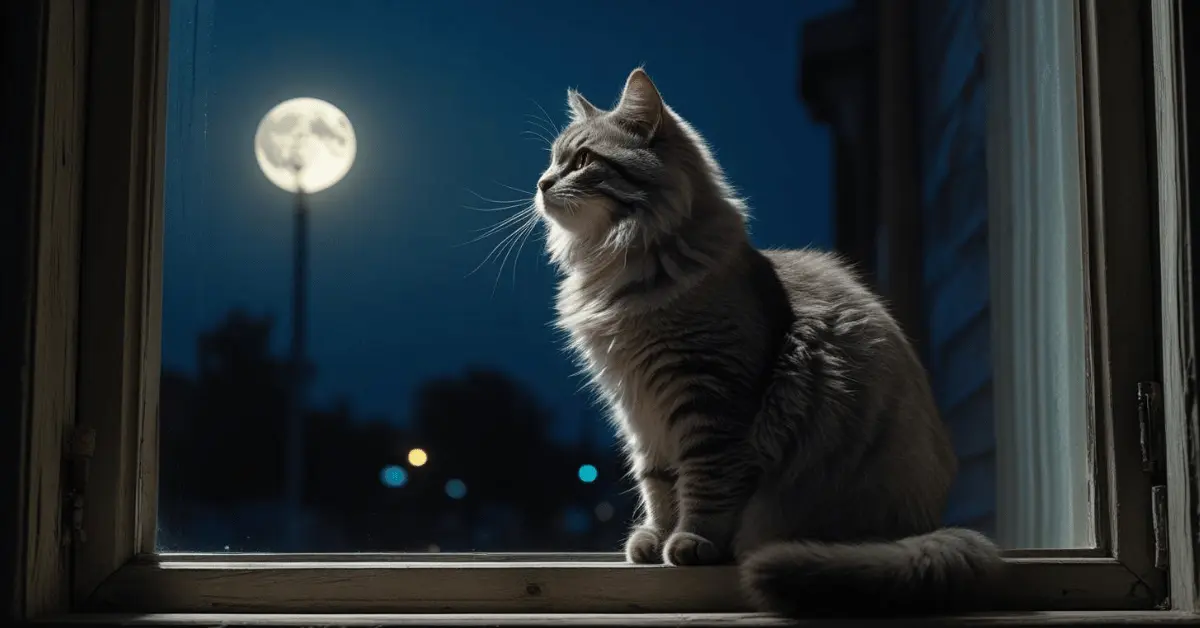Cats cry at night for many reasons — from seeking attention and expressing hunger to mating instincts or even underlying health issues. While it might sound alarming, these cries are part of your cat’s natural communication.
Seeking Attention or Affection 🐾
Cats are social creatures, and night time can make them crave company and comfort — especially if you’ve been busy during the day.
A cat crying like a baby is often saying:
“I miss you. Spend time with me!”
Signs It’s Attention-Seeking
- Crying near your bedroom door.
- Following you around while meowing.
- Stopping when you interact with them.
⚡ Pro Tip: Give your cat enough playtime and cuddles during the day. A tired, satisfied cat is less likely to cry at night.
Hunger or Thirst 🍽️
One of the most common reasons cats cry at night is hunger. If their dinner was too early or their feeding schedule is inconsistent, they’ll remind you in the loudest way possible.
How to Know It’s Food-Related
- Crying leads you to the food bowl.
- Stops after feeding or giving treats.
- Becomes frequent if meals are skipped or delayed.
⚡ Pro Tip: Schedule a small meal before bedtime or use an automatic feeder to keep your cat satisfied overnight.
Mating Instincts and Hormonal Behaviour 😼
Unneutered cats often cry loudly at night due to mating instincts. These cries resemble baby-like wails and can be surprisingly intense.
Signs It’s Related to Mating
- Loud, drawn-out meows or howls.
- Rolling on the floor and rubbing against furniture.
- Increased restlessness at night.
⚡ Pro Tip: Spaying or neutering your cat can significantly reduce hormonal-driven cries and make them calmer at night.
Related Posts
- Why Does My Cat Lick Me Then Bite Me?
- Why Do Cats Meow at Night?
- Why Do Cats Knead Blankets and Pillows?
- Why Do Cats Sit on Laptops and Books?
- Why Do Cats Roll on the Floor When They See You?
Feeling Lonely or Stressed 😿

Cats may cry like babies at night when they feel anxious, lonely, or insecure — especially if they’re left alone in another room.
Triggers for Stress-Induced Crying
- A new environment or recent move.
- Changes in routine or household members.
- New pets or noises disrupting their sense of security.
Aging and Cognitive Decline 🧠
Older cats sometimes suffer from cognitive dysfunction syndrome (CDS), similar to dementia in humans. This can cause confusion, disorientation, and loud night time crying.
Signs of Senior Cat Cognitive Issues
- Crying while wandering aimlessly at night.
- Appearing lost in familiar spaces.
- Increased restlessness after dark.
⚡ Pro Tip: If you suspect cognitive decline, consult a vet. They may suggest environmental enrichment or supplements to reduce anxiety.
Underlying Health Issues ⚠️
Sometimes, excessive night time crying can signal a medical problem. Cats often vocalize more when they’re in pain or uncomfortable.
Possible Health Concerns
- Hyperthyroidism (causes hyperactivity and loud meowing).
- Urinary tract infections.
- Arthritis or joint pain.
- Vision or hearing loss, especially in older cats.
⚡ Pro Tip: If your cat’s crying is sudden, frequent, or sounds distressed, book a vet visit immediately.
How to Calm a Cat Crying Like a Baby at Night 🐱

To stop your cat from crying like a baby at night, you need to focus on reducing their restlessness, fulfilling their needs, and creating a calming environment.
1. Play With Your Cat Before Bedtime 🎾
Cats are naturally active at night, so if they don’t burn enough energy during the day, they may cry out of boredom. Spending 15–20 minutes playing with your cat before bedtime helps tire them out and promotes peaceful sleep.
Playtime Ideas:
- Feather wands and teaser toys
- Laser pointers for chasing
- Small rolling balls or toy mice
2. Feed a Small Meal Late in the Evening 🍽️
Cats often cry at night when hungry. Giving them a light meal right before bedtime keeps their stomachs satisfied and reduces hunger-driven cries.
Tips to Manage Night Hunger:
- Use an automatic feeder for scheduled night time snacks.
- Ensure consistent feeding times to set a routine.
3. Consult a Vet If the Crying Is New or Excessive ⚠️
If your cat suddenly starts crying like a baby at night, it could indicate a medical issue.
- Hyperthyroidism
- Urinary tract infections
- Arthritis or joint pain
- Cognitive decline in older cats
A vet can diagnose and treat underlying conditions, helping reduce night time meowing.
Other Night time Cat Behaviours You Should Know 🌙
Cats are naturally more active at night, and their behaviour often seems strange or noisy to us. Understanding these actions can help you create a calmer environment and enjoy peaceful nights.
1. Knocking Objects Down 🪴
If your cat loves pushing items off tables or shelves at night, it’s usually seeking attention or trying to initiate playtime. Cats learn quickly that knocking things down gets a reaction from you, even if it’s negative.
How to Handle It:
- Engage in interactive play before bedtime to tire them out.
- Provide puzzle toys or treats to keep them occupied.
- Remove fragile objects from easy reach.
2. Zoomies at Midnight 🏃♀️
The “midnight zoomies” — when your cat suddenly sprints around the house — are normal. Cats are crepuscular, meaning they’re naturally most active during dawn and dusk. If your cat sleeps all day, expect bursts of energy late at night.
How to Reduce Midnight Zoomies:
- Schedule long play sessions in the evening.
- Provide climbing trees or scratch posts to channel energy.
- Maintain a consistent routine to help regulate sleep patterns.
3. Chirping at Windows 🪟
When cats chirp or chatter at windows, they’re reacting to sights and sounds outside — other cats, birds, insects, or moving shadows. This is an instinctive hunting response.
Tips to Manage Chirping:
- Close curtains or blinds to limit distractions.
- Offer window perches for safe, quiet observation.
- Provide interactive toys indoors to satisfy hunting instincts.
Why Understanding Cats’ Night Behaviours Matters 🌌

Understanding why cats act up at night is important because it helps you manage their behavior, reduce stress, and create a calmer environment for both you and your pet.
- Reduce unwanted meowing and disruptive nighttime noise.
- Lower your cat’s stress by providing proper enrichment.
- Enjoy peaceful, restful nights while keeping your cat happy and healthy.
Common Questions
Why does my cat cry like a baby outside my bedroom door?
It’s likely seeking your attention or feeling lonely and wants to be near you.
Why does my cat cry loudly at night but not during the day?
Night time is when cats are naturally more active. Combine that with hunger, boredom, or mating instincts, and you get baby-like cries.
Should I ignore my cat when it cries at night?
No — first, rule out hunger, illness, or stress. If it’s purely attention-seeking, gentle training can help manage the behaviour.


2 thoughts on “Why Do Cats Cry Like Babies at Night? 6 Surprising Reasons”